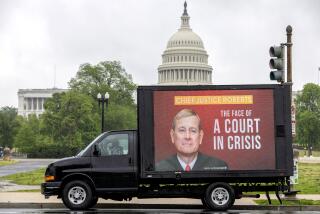When Appearance Is All: Sununu Pursues the Trappings of Power : Politics: The chief of staff brought to Washington the same arrogance his idol, Sherman Adams, did. Will he leave in disgrace, as Adams did?
- Share via
WASHINGTON — If absolute power corrupts absolutely, in what way does constrained democratic power corrupt? In travel scandals, if John H. Sununu and his historical predecessor Sherman L. Adams, White House chief of staff under Dwight D. Eisenhower, are any example.
A quick review of the many parallels between Sununu and Adams: Both were governors of New Hampshire when they ran state campaigns of underdog candidates for the GOP presidential nomination. Both produced victories and were rewarded when their men won the general election. Both, in the White House, insisted on being addressed as “governor.” Sununu and Adams also share many personality traits: intelligence, conservative politics, arrogance toward virtually everybody. Oh, yes, and Adams is one of Sununu’s heroes. When Sununu came to Washington, he went to great lengths to secure the same license-plate number Adams once had.
But Adams left the White House in dishonor. True, he accepted a vicuna coat, but travel was the main cause. He and family members stayed in four-star hotels and charged the bills to a corrupt investor under government investigation. Adams had been warned that dubious travel billings are a formula for political trouble. Like Sununu, he dismissed the warnings.
Why do intelligent people like Sununu and Adams do foolish things with their travel accounts? A principal reason is that they long to feel important.
Democratic systems purposely create uncertainty about who holds real power. Elaborate constitutional cross-checking mechanisms prohibit holders of high office from exercising authority by fiat: Power manifests itself as the ability to influence rather than command, and that may be exercised from many points on the depth chart--not just the top.
Another aspect of democratic systems is an anti-regal civil tradition. So when people who have just ascended to high public office arrive in Washington, expecting to be treated as Big Men, they often experience letdowns. Washington offers little state opulence; there is an almost total absence of the power cues found in Hollywood versions of Washington, where every office window frames a sweeping view of the Capitol dome and even deputy undersecretaries of the Farm Credit Administration travel in limousines with gorgeous blondes.
New members of Congress discover, for example, they have not been assigned vast wood-paneled offices overlooking the Tidal Basin, but cramped cubbyholes off basement corridors. New foreign-policy officials discover, to their horror, that State Department headquarters is a crumbling blockhouse that makes a Wal-Mart seem elegant. And new White House personnel discover, even though they hold some of the world’s most important jobs, that there are restrictions on matters as small as who can buy them lunch.
Thus, a longing for the trappings of power--for a false sense of authority--can set in. During office hours, the Washington skyline is laced with the beeline flights of dark-green helicopters, shuttling military officers from the Pentagon to appointments. Whether anyone saves time by this is an open question, but helicopter flights are a much sought-after perk on the part of senior officers.
Adams got into trouble because the kind of hotels that government per diem covers were insufficiently stately for his self-image. Sununu is now in trouble not just because he wished to avoid the indignity of having to stand in line with mere plebeians waiting to board a common commercial airliner. He longed for the full trappings of the power package--being swept by motorcade to Andrews Air Force Base instead of National Airport (where anybody who can afford a ticket can fly); having subalterns hovering about saying, “Gov. Sununu, your jet awaits;” being the sole passenger; signaling the pilot to depart with an imperial wave.
White House personnel taste this sensation occasionally--when they travel with the President aboard Air Force One. Officials with their wits about them enjoy such experiences, but realize this fantasy aspect of Washington life applies on a regular basis only to the President. Officials who want their egos flattered, like Sununu, strive to be little presidents.
One of the ironies of government cost-control regulations is that even top officials like Sununu can rarely obtain approval for first-class air fare. Yet the same regulations do permit them to fly as the sole passenger on military jets. So the taxpayer, rather than shelling out $1,000 to American or United, shells out $20,000 or $30,000 for a boarding pass on Air Force Express. Allowing senior government officials and members of Congress to fly first-class would certainly cost less.
Another irony is government officials now sell out their positions for hardly anything. During the good old days, like the Teapot Dome scandal of the Harding Administration, people traded on high executive positions for envelopes of cold cash. Today, owing to good-government laws, direct cash bribery of federal officials is nearly unknown. So, the Keating Five got in Dutch not for taking money for themselves, rather for donations to their reelection funds. Sununu may lose his job over fleeting travel luxuries.
One rationalization often heard from Washington higher-ups about their pursuit of perks is, “We are the CEOs of the United States,” yet are paid far less than top corporate managers and receive fewer trappings of power. There is truth to this: Most big corporate chief executive officers have access to private jets, and nobody gets upset when they use them for valid business purposes--though even a CEO would get into hot water for taking the company plane to the dentist.
But people who make this argument are the last kind who ought to be running a democratic government. Yes, CEOs have private planes, but shareholders finance them voluntarily; private planes financed from public revenue are another matter. Do we want the kind of people sitting in the White House whose flesh crawls at the thought of having to sit next to young mothers or overweight salesmen in the waiting lounge at National Airport?
Well-run democratic systems are designed to produce a leadership class that lives and behaves like regular folk, the better to govern with appreciation for the problems of daily life. Sharing the common experience, rather than insisting on special privileges, might help Sununu make a real-world decision the next time, say, an airline-deregulation issue comes across his desk.
How to assess Sununu’s sins? The use of military aircraft for personal or GOP business constitutes a true outrage. It also demonstrates a venal form of hypocrisy for Sununu--who has lectured so often about how the budget must be cut and there is not one spare dime for increased health care for the poor--to shower himself with public travel dollars.
It is possible to defend Sununu’s use of a government car to drive him to New York for personal business. Cost here was at best a few hundred dollars, and if, as Sununu claims, he did paperwork all the way, this expense was well worth it.
To a point, it’s also possible to defend Sununu’s acceptance of a corporate jet ride. This did not cause taxpayers unnecessary expenses. But the way the ride was arranged speaks volumes. Sununu aides were frantic in the days before, madly calling to find someone who could covertly supply the boss a private plane. White House lawyers spent hours reviewing deceptively worded filings about the flight. Any legitimate people’s-business time saved when Sununu took the government car was wasted arranging for the private jet, just to spare Sununu the indignity of waiting in line to board TWA.
These are not the actions of a government official with his priorities in order. As chief of staff, Sununu’s first responsibility is management: Wasting staff time on a silly personal perk shows he is a bad manager. Sununu’s second responsibility is to protect the President politically: Repeating mistakes after being caught shows both bad political judgment and that Sununu’s first loyalty is to himself, not the President he serves. As often happens in Washington, it is not the mistake, but actions after the mistake comes to light, that Sununu is being judged on--and he looks worse daily.
He also looks friendless. It is significant that no GOP worthy has stood up to defend the chief of staff--almost amazing, considering the favors Sununu could bestow in return. But through his arrogant treatment of others--even in his own party--Sununu has not only failed to win friends, but created large numbers who are not sorry to see him suffer.
Here the parallel to Adams recurs. When the Adams scandal broke, the chief of staff might have held on had he promptly apologized, and had allies speak in his defense. Instead, Adams, like Sununu, refused to admit he had done anything wrong. No friends spoke to defend him, because he had none. Will Senate Minority Leader Robert Dole, Housing and Urban Development Secretary Jack Kemp, House Minority Leader Bob Michel or any others take the pressure off Sununu by defending him? Don’t hold your breath.
More to Read
Sign up for Essential California
The most important California stories and recommendations in your inbox every morning.
You may occasionally receive promotional content from the Los Angeles Times.













